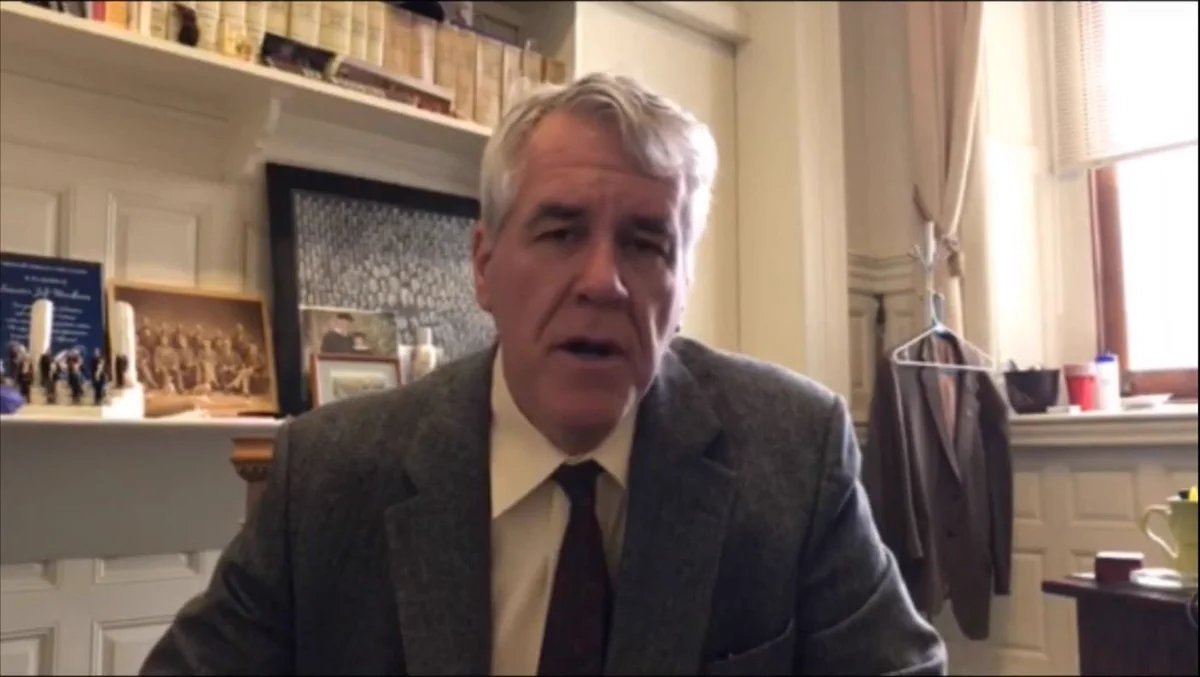Woodburn Appeal Rejected, Former Dem Senate Leader Faces Jail

Disgraced Democrat Jeff Woodburn is heading to jail after the New Hampshire Supreme Court rejected the appeal of his criminal mischief convictions.
The court released its decision Tuesday ruling against Woodburn’s quest for a new trial on those convictions, leaving the former state senator to serve the two 30-day sentences connected to the domestic violence case that ended his career.
“Today, the New Hampshire Supreme Court denied Jeffrey Woodburn’s motion for a new trial, leaving in place his sentence of 30 days of incarceration for his prior convictions,” New Hampshire Attorney General John Formella said in a statement. “After a lengthy and challenging legal process, this decision is consistent with our steadfast commitment to justice and our ongoing support for victims of domestic violence. We remain dedicated to upholding the law and advocating for those affected by such crimes.”
Woodburn is still free for now and his attorney, Mark Sisti, is still fighting. Sisti told NHJournal he plans to oppose any state motion to impose the sentence.
“We will be stridently objecting to any incarceration,” Sisti said.
All of the charges stemming from Woodburn’s alleged assaultive conduct against the woman were either dismisses by the state, or a jury, Sisti said. A 30-day jail sentence for criminal mischief is out of proportion to the crime, Sisti noted, especially considering Woodburn has been free on bail for five years without incident.
Woodburn isn’t the only former Democratic state legislator facing jail time. Former Nashua state Rep. Stacie Marie Laughton, 39, of Nashua, N.H., is facing federal charges of sexual exploitation of children and aiding and abetting, and state charges of child pornography. Laughton was elected three times as a Nashua Democrat, always with the endorsement of the state Democratic Party.
The legal drama surrounding Woodburn’s case has been dragging out since 2018, when the former Senate Minority Leader was first arrested for allegedly abusing his then girlfriend. He was convicted on counts of domestic violence, simple assault, and criminal mischief after his first trial in 2021, but a later Supreme Court ruling overturned the domestic violence and simple assault charges, sending them back for a second trial.
That second trial ended with a hung jury earlier this year, and Formella opted to drop the case rather than go for a third trial. All the time, Woodburn has been trying to avoid jail and get the criminal mischief counts overturned.
Woodburn wanted a new trial on the two convictions, claiming his prior defense attorney did not provide effective counsel during the 2021 trial. According to Woodburn’s appeal, his first lawyer should have severed the charges and had the criminal mischief counts before a separate jury. Having all of the counts at one trial resulted in the jury being biased against him, according to the appeal.
But the justices ruled Woodburn failed to show his original lawyer performed in a substandard way that would trigger overturning the convictions. The justices also found that the 2021 jury found Woodburn not guilty on several counts, and therefore he could not show a particular bias.
“The strength of the evidence related to the criminal mischief charges, in combination with the jury’s multiple not guilty findings as to other related charges, indicate that it was the direct evidence of the underlying conduct, rather than any extraneous relationship information that may have been rendered admissible due to the joinder of multiple charges, that prompted the jury’s guilty findings on the criminal mischief charges,” the justices wrote.
Amanda Grady Sexton, director of public affairs for the New Hampshire Coalition Against Domestic and Sexual Violence, said Tuesday’s decision shows Woodburn cannot escape the convictions.
“This is a small measure of accountability for an offender who tried to avoid it at all costs. No one should think they are above the law,” Grady Sexton said.
Woodburn lost political support almost immediately after he was charged in 2018, with Democratic Party leaders calling on him to step aside. Instead, Woodburn ran and won a primary to retain his seat in the Senate. He then lost the general election to a political unknown. Woodburn has been out of politics since.
Court records show Woodburn was planning a run for governor before he was arrested, and that he was grooming the woman to a “first lady.”
The state’s brief filed in the appeal paints a picture of Woodburn as a controlling man with a drinking problem who made his new girlfriend fear for her safety months before he was charged in 2018. According to the brief, the woman, 17 years his junior, worked as the Democratic Party chair for Coos County and helped get Woodburn elected. He started pursuing a romantic relationship with her in 2015 as his marriage was falling apart, according to the filing.
Soon after they got engaged in 2017, the state says, Woodburn began publicizing their relationship to help his political career.
“[Woodburn] posted pictures on social media and told the victim that this was ‘very important to him,’ because dating her would help him with his career,” the filing states. “Although he liked the way that the victim could ‘approach a stranger with a Bernie sticker,’ he also told her that she should ‘behave like a first lady.’ He told her that she was not to criticize him, ‘especially in public, because he hoped to be governor.’”












